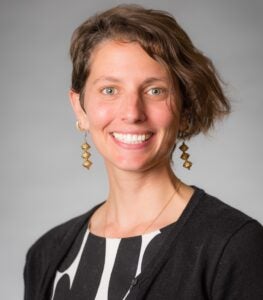Assistant Professor
Department of Civil and Environmental Engineering
University of South Florida
Tampa, Florida
kalfredo@usf.edu
Fellowship Project: Using a Risk Cup approach to evaluate vulnerabilities associated with community water systems in the US
Dr. Katherine Alfredo is an Assistant Professor in the Department of Civil and Environmental Engineering at the University of South Florida. Dr. Alfredo has extensive international experience that includes two US Fulbright Fellowships. Prior to joining the faculty at USF, she was the Research Program Manager at DC Water focused on the difficulties large, urban utilities face in ensuring a constant supply of high quality, potable water. She holds a Professional Engineering license in the state of Virginia.
Katherine is keen to develop studies through the JPB Fellowship that would allow her to understand the relationship between actual and perceived drinking water risk on a household’s water source and home water treatment technology decisions.
Fellowship Project: Using a Risk Cup approach to evaluate vulnerabilities associated with community water systems in the US
This study aims to better understand the safety of drinking water in the United States by developing a “Risk Cup” analysis to evaluate the cumulative health risks associated with drinking water from over 2,300 Community Water Systems (CWSs) that have reported violations. Despite efforts like the Infrastructure Bill to improve water quality, there’s still no comprehensive measure for comparing the combined health risks from multiple contaminants, socioeconomic and environmental factors, and residential plumbing. This is crucial as the number of regulated contaminants increases and new ones are identified. Our study will assess the overall water health for each CWS, aligning it with household perceptions of drinking water risk, especially within ethnic minority groups who have shown reluctance towards tap water consumption. Focusing on Florida, we will quantify the health risk per glass of water, examine the link between health risk and social vulnerability, and investigate the perceived risks in both high-risk and low-risk communities to initiate a more informed dialogue about health risks for vulnerable populations.
